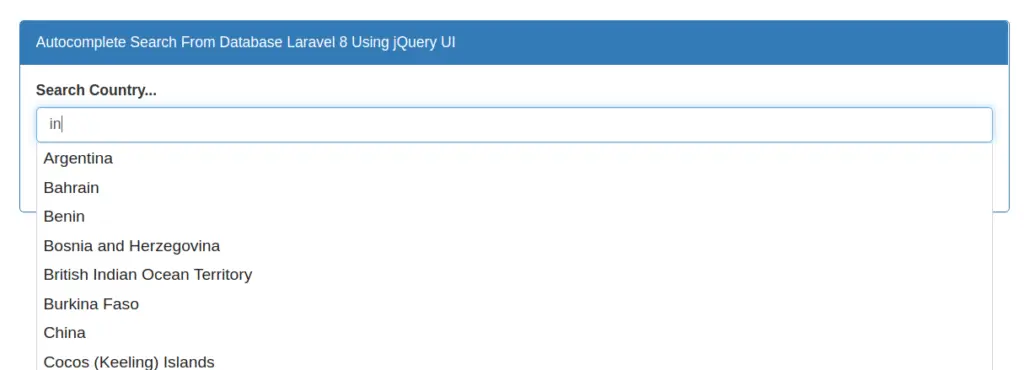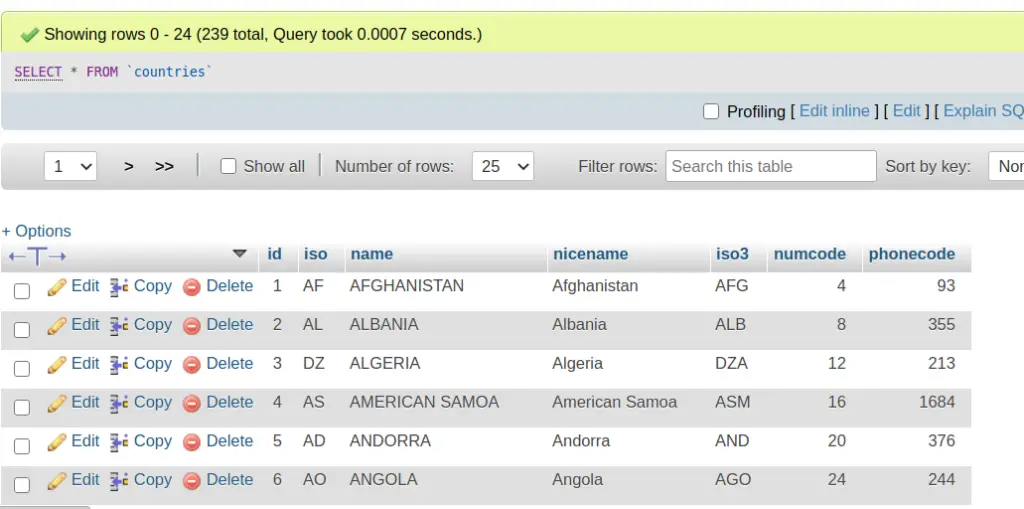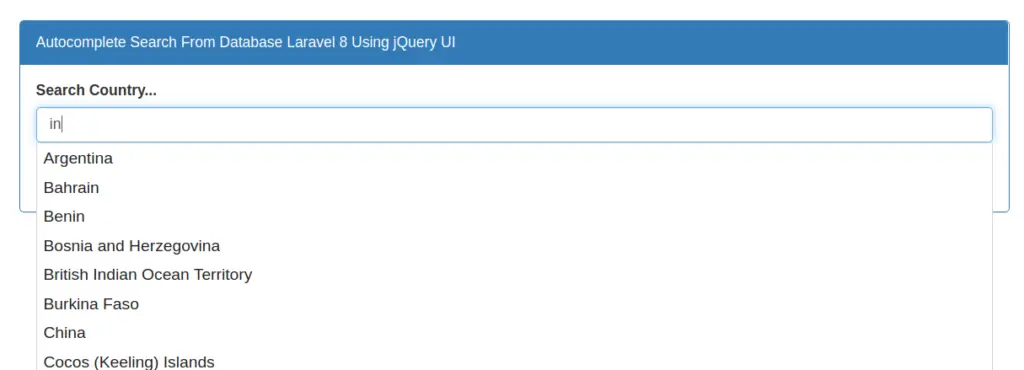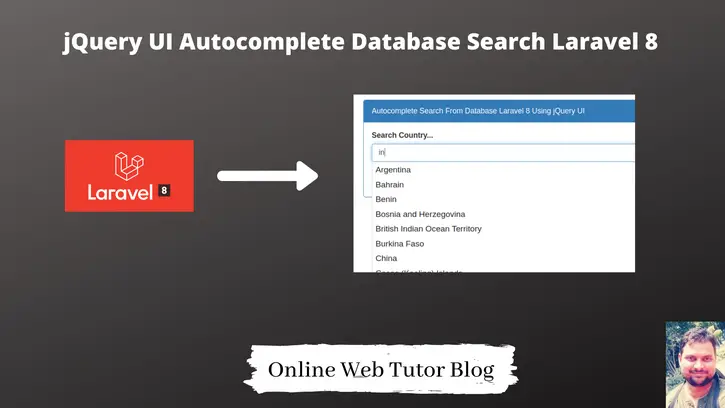Inside this article we will see the concept of autocomplete search using jquery ui in Laravel 8. This autocomplete search will be total dynamic which searches data from database.
You will get the complete concept of jQuery UI Autocomplete Database Search Laravel 8.
Learn More –
- How To Get Current Location Details in Laravel 8 Tutorial
- How to Get Logged in User Data in Laravel 8 Tutorial
- How to Install Vue js in Laravel 8 Tutorial
- How to Install Vue js in Laravel 8 Using Laravel UI?
This tutorial will use a complete basic idea to learn as well as to integrate in a very easy way. This will use jquery ui which binds autocomplete data set.

Let’s get started.
Laravel Installation
We will create laravel project using composer. So, please make sure your system should have composer installed. If not, may be this article will help you to Install composer in system.
Here is the command to create a laravel project-
composer create-project --prefer-dist laravel/laravel blog
To start the development server of Laravel –
php artisan serve
URL: http://127.0.0.1:8000
Assuming laravel already installed inside your system.
Create Database & Connect
To create a database, either we can create via Manual tool of PhpMyadmin or by means of a mysql command.
CREATE DATABASE laravel_app;
To connect database with application, Open .env file from application root. Search for DB_ and update your details.
DB_CONNECTION=mysql DB_HOST=127.0.0.1 DB_PORT=3306 DB_DATABASE=laravel_app DB_USERNAME=root DB_PASSWORD=root
Create Model and Migrations
Open project into terminal and run this command.
$ php artisan make:model Country -m
It will create two files –
- Model file Country.php at /app/Models folder.
- Migration file 2021_06_27_151155_create_countries_table.php at /database/migrations folder.
Open Migration file 2021_06_27_151155_create_countries_table.php and write this complete code into it.
<?php
use Illuminate\Database\Migrations\Migration;
use Illuminate\Database\Schema\Blueprint;
use Illuminate\Support\Facades\Schema;
class CreateCountriesTable extends Migration
{
/**
* Run the migrations.
*
* @return void
*/
public function up()
{
Schema::create('countries', function (Blueprint $table) {
$table->id();
$table->char("iso", 2);
$table->string("name", 50);
$table->string("nicename", 50);
$table->char("iso3", 3)->nullable();
$table->smallInteger("numcode")->nullable();
$table->integer("phonecode")->nullable();
});
}
/**
* Reverse the migrations.
*
* @return void
*/
public function down()
{
Schema::dropIfExists('countries');
}
}Open Country.php model file and write this complete code into it.
<?php
namespace App\Models;
use Illuminate\Database\Eloquent\Factories\HasFactory;
use Illuminate\Database\Eloquent\Model;
class Country extends Model
{
use HasFactory;
public $timestamps = false;
}
Run Migration
Back to terminal and run this command to run migration and create table.
$ php artisan migrate
It will run all migrations.
Insert Data into Table
As from migration we have created a table named as countries. We need some data into this table to test autocomplete search.
For data here we have the link of github.
Run the given mysql query to your database from this github link.
When you will run, you will get data something like this.

Create Controller
Back to terminal and run this command to create controller file.
$ php artisan make:controller SearchController
It will create SearchController.php file inside /app/Http/Controllers folder.
<?php
namespace App\Http\Controllers;
use Illuminate\Http\Request;
use App\Models\Country;
class SearchController extends Controller
{
/**
* Display a listing of the resource.
*
* @return \Illuminate\Http\Response
*/
public function index()
{
return view('search');
}
/**
* Show the form for creating a new resource.
*
* @return \Illuminate\Http\Response
*/
public function autocomplete(Request $request)
{
$input = $request->all();
$data = Country::select(["id", "nicename"])
->where("nicename","LIKE","%{$input['query']}%")
->get();
$countries = [];
if(count($data) > 0){
foreach($data as $country){
$countries[] = array(
"value" => $country->id,
"label" => $country->nicename,
);
}
}
return response()->json($countries);
}
}Add Routes
Open web.php file from /routes folder. Add these given routes into it.
//..
use App\Http\Controllers\SearchController;
Route::get('search', [SearchController::class, 'index'])->name('search');
Route::post('autocomplete', [SearchController::class, 'autocomplete'])->name('autocomplete');
//..
Download jQuery UI
- Download the jQuery UI plugin from here.
- Extract it in the
<strong>public/</strong>folder at the root.
You can also use CDN –
<!-- Script --> <script src="https://ajax.googleapis.com/ajax/libs/jquery/3.5.1/jquery.min.js"></script> <!-- jQuery UI --> <link rel="stylesheet" href="https://ajax.googleapis.com/ajax/libs/jqueryui/1.12.1/themes/smoothness/jquery-ui.css"> <script src="https://ajax.googleapis.com/ajax/libs/jqueryui/1.12.1/jquery-ui.min.js"></script>
Create Blade Layout File
Create search.blade.php file inside /resources/views folder.
Open search.blade.php and write this complete code into it.
<!DOCTYPE html>
<html>
<head>
<title>Autocomplete Search From Database Laravel 8 Using jQuery UI</title>
<link rel="stylesheet" href="https://maxcdn.bootstrapcdn.com/bootstrap/3.4.1/css/bootstrap.min.css">
<!-- jQuery UI CSS -->
<link rel="stylesheet" href="https://ajax.googleapis.com/ajax/libs/jqueryui/1.12.1/themes/smoothness/jquery-ui.css">
<!-- <link rel="stylesheet" type="text/css" href="/jquery-ui/jquery-ui.min.css"> -->
<!-- jQuery -->
<script src="https://ajax.googleapis.com/ajax/libs/jquery/3.5.1/jquery.min.js"></script>
<!-- jQuery UI JS -->
<script src="https://ajax.googleapis.com/ajax/libs/jqueryui/1.12.1/jquery-ui.min.js"></script>
<!-- <script type="text/javascript" src="/jquery-ui/jquery-ui.min.js"></script> -->
</head>
<body>
<div class="container" style="margin-top: 40px;">
<div class="panel panel-primary">
<div class="panel-heading">Autocomplete Search From Database Laravel 8 Using jQuery UI</div>
<div class="panel-body">
<label>Search Country...</label>
<input class="form-control" id="autocomplete_country" type="text">
<br>
<p>Country ID : <span id="countryId"></span></p>
</div>
</div>
</div>
<!-- Script -->
<script type='text/javascript'>
$(document).ready(function() {
// Initialize
$("#autocomplete_country").autocomplete({
source: function(request, response) {
return $.post("{{ route('autocomplete') }}", {
query: request.term,
"_token": "{{ csrf_token() }}",
}, function(data) {
response(data);
});
},
select: function(event, ui) {
// Set selection
$('#autocomplete_country').val(ui.item.label); // display the selected text
$('#countryId').text(ui.item.value); // save selected id to input
return false;
},
focus: function(event, ui) {
$("#autocomplete_country").val(ui.item.label);
$("#countryId").text(ui.item.value);
return false;
},
});
});
</script>
</body>
</html>Application Testing
Run this command into project terminal to start development server,
php artisan serveURL – http://127.0.0.1:8000/search

We hope this article helped you to learn about jQuery UI Autocomplete Database Search Laravel 8 in a very detailed way.
If you liked this article, then please subscribe to our YouTube Channel for PHP & it’s framework, WordPress, Node Js video tutorials. You can also find us on Twitter and Facebook.
Read more